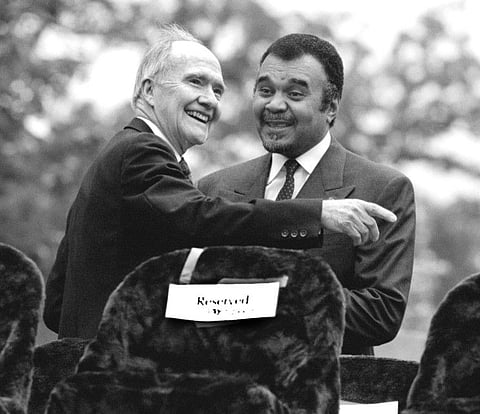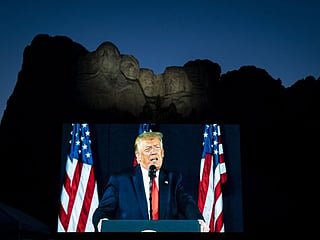Brent Scowcroft, force on US foreign policy for 40 Years, dies at 95
He was a diplomat, linguist, tactician on nuclear arms, and scholar of global politics

Also In This Package
Washington: Brent Scowcroft, a preeminent foreign policy expert who helped shape America’s international and strategic decisions for decades as the national security adviser to Presidents Gerald R. Ford and George H.W. Bush and as a counselor to seven administrations, died Thursday at his home in Falls Church, Virginia. He was 95.
His death was announced by a family spokesman, Jim McGrath, who did not cite a specific cause.
Scowcroft wanted to be a fighter pilot after World War II, but a plane crash changed the young man’s life and, as it turned out, gave the nation one of its most authoritative military intellectuals - a diplomat, linguist, tactician on nuclear arms and missile systems, and a scholar of global politics who became an influential voice in Washington for more than 40 years.
He accompanied President Richard Nixon to China in 1972, oversaw the Ford administration’s evacuation of Americans from Saigon in 1975, laid groundwork for President Jimmy Carter’s Strategic Arms Limitation Treaty with the Soviet Union in 1979, evaluated the MX missile systems for President Ronald Reagan in the 1980s and directed Bush’s strategy in the Gulf War in 1991.
Scowcroft was a principal architect of US policy towards post-communist Russia, a leading Republican voice opposing the US-led invasion of Iraq after the September 11, 2001, terrorist attacks and a voice in President Barack Obama’s selection of a national security team after the 2008 elections.
He also wrote books, taught at universities and counted among his many proteges Condoleezza Rice and Robert Gates, both national security experts who became secretaries of state and defence for President George W. Bush.
Most closely associated with moderate Republicans like Ford, Howard Baker and Colin Powell, Scowcroft (pronounced SKO-croft) was a self-effacing former Air Force general who did not smoke or drink. He preferred working quietly in small groups.
In making foreign policy, a national security adviser coordinates the work of the National Security Council - the president, vice president, secretaries of state and defence and others, supported by a staff that writes papers and proposals - and makes sure the president hears all sides of the debate before making decisions.
Scowcroft called himself a traditionalist, who believed that the nation should work with allies and international organisations, as opposed to a “transformationalist,” like George W. Bush, who argued that America should fight terrorism by spreading democracy in the world - by force if necessary - and should be free to act swiftly without relying on overly cautious allies or a cumbersome United Nations.
After leaving government in 1993, Scowcroft headed the Washington-based Scowcroft Group, a consulting firm for international businesses, and was chair of an advisory board that made policy recommendations to George W. Bush.
Nevertheless, he was among the few prominent Republicans who challenged George W. Bush in 2002 as the administration made its case to go to war in Iraq.
Obama liked Scowcroft and his restrained foreign policy, Jeffrey Goldberg noted in The Atlantic in 2016. “Obama, unlike liberal interventionists, is an admirer of the foreign-policy realism of President George H.W. Bush and, in particular, of Bush’s national security adviser, Brent Scowcroft,” he wrote. “As Obama was writing his campaign manifesto, ‘The Audacity of Hope,’ in 2006, Susan Rice, then an informal adviser, felt it necessary to remind him to include at least one line of praise for the foreign policy of President Bill Clinton, to partially balance the praise he showered on Bush and Scowcroft.”
Long after his retirement, Scowcroft remained a pillar of the Republican national security establishment. In the runup to the 2016 presidential election, he joined more than 120 other Republican foreign policy veterans who crossed party lines and endorsed Hillary Clinton. Scowcroft said she possessed “truly unique experience and perspective” to “lead our country at this critical time.” He did not mention Donald Trump in his endorsement.
But days after Trump’s election, the frail and ailing Scowcroft made an emotional appeal at an off-the-record Washington luncheon in his honour, calling on fellow Republicans, and Democrats, to put country above political party and accept posts in the incoming Trump administration, if asked to do so - even though, by some accounts, he remained concerned that Trump was ill-prepared and unsuited for the presidency.
“He needs you; your country needs you,” one attendee said, characterizing Scowcroft’s message.
His appeal for public service was a classic reminder of a less partisan age, when presidents often reached out to experienced talent, regardless of party loyalties.
Brent Scowcroft was born March 19, 1925, in Ogden, Utah, the son of James and Lucile (Ballantyne) Scowcroft. He graduated from the US Military Academy at West Point in 1947, joined the Air Force and envisioned life as a fighter pilot.
But Jan. 6, 1949, his P-51 Mustang developed engine trouble after taking off from Grenier Army Air Field in New Hampshire (now Manchester-Boston Regional Airport), and crash-landed. His injuries were not critical, but he assumed he would never fly again and considered other military career options.
In 1951, he married the former Marian Horner. She died in 1995. He is survived by their daughter, Karen Scowcroft, and a granddaughter.
He accompanied Nixon on his historic trip to China to establish diplomatic relations after decades of estrangement. Fluent in Russian, Scowcroft next went to Moscow to prepare for Nixon’s spring visit, a delicate task because America was bombing North Vietnam, a Soviet ally. Impressed, Henry Kissinger, then head of national security, chose him as his deputy in 1973. That fall, Kissinger became secretary of state, and Scowcroft ran Security Council meetings in his absence.
At the White House, Scowcroft put in 18-hour days, working from a cramped, cable-strewn cubby near the Oval Office. In 1975, after Nixon had resigned in the Watergate scandal, Scowcroft briefed the new president, Ford, on national security. Ford chose him to succeed Kissinger as the national security adviser. To accept, he resigned his commission as a lieutenant general.
As US involvement in the Vietnam War ended in 1975, Scowcroft planned the evacuation of US personnel from Saigon, and later a military response to the Cambodian seizure of American merchant ship S.S. Mayaguez. The ship and 39 crewmen were saved, but 41 US servicemen died.
Scowcroft left the White House in 1977, when Carter became president. He later went to work for Kissinger’s international consulting firm, Kissinger Associates. But he remained a member of the president’s advisory committee on arms control and helped formulate the Strategic Arms Limitation Treaty II signed by Carter and Soviet leader Leonid Brezhnev in 1979. The treaty, though not ratified by Congress, was honored until 1986, when the Reagan administration withdrew.
Reagan named Scowcroft to head a commission that evaluated options for deployment of the MX missiles.Later Reagan appointed him to a commission led by former Sen. John Tower that investigated the Iran-Contra scandal, in which money from arms sales to Iran was diverted without authorization to anti-communist rebels in Nicaragua. The commission found no evidence that Reagan had known of skulduggery but it criticised him for failing to monitor subordinates.
While it is rare for officials to return to White House jobs, Scowcroft was an early and easy choice of George H.W. Bush for national security adviser in 1989. Scowcroft chose Gates as his deputy and Condoleezza Rice, a Soviet expert, as a council member.
In 1991 Scowcroft was the guiding hand behind what Bush regarded as the triumph of his political life, Operation Desert Storm, in which the president mobilised an international coalition to oust an invading Saddam from neighbouring Kuwait. Scowcroft generally drew narrow military goals and the Persian Gulf War was no exception. He urged Bush to limit operations to evicting Iraqi troops from Kuwait and not to depose Saddam, unless the dictator resorted to chemical or biological warfare against coalition forces or Israel. Bush awarded Scowcroft the Presidential Medal of Freedom, the nation’s highest civilian honour.








